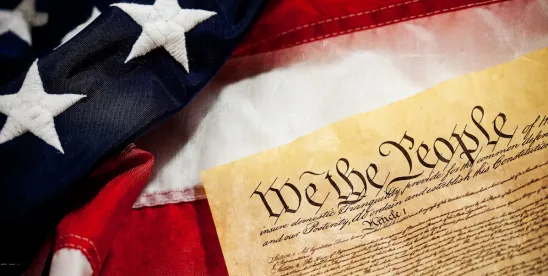In a first-of-its-kind ruling on 30 September 2024, Judge Kathryn Kimball Mizelle of the US District Court for the Middle District of Florida held in United States ex rel. Zafirov v. Florida Med. Assocs., LLC that the qui tam provisions of the False Claims Act (FCA) are unconstitutional. No. 19-cv-01236, 2024 WL 4349242, at *18 (M.D. Fla. Sept. 30, 2024). Specifically, Judge Mizelle found that qui tam relators in FCA actions qualify as executive branch “Officers” who are not properly appointed, thereby violating the Appointments Clause of Article II of the US Constitution.
The holding adopts Appointments Clause arguments that have been gaining traction in recent Supreme Court opinions. It also addresses some of the “serious constitutional questions” that Justice Clarence Thomas had raised regarding the FCA’s qui tam provisions in his dissent in the Supreme Court’s June 2023 decision in United States ex rel. Polansky v. Exec. Health Res., Inc., 599 U.S. 419, 449 (2024) (Thomas, J., dissenting). Notably, Judge Mizelle’s decision in Zafirov is contrary to a number of other decisions post-Polansky that rejected similar constitutional arguments.
The decision is sure to be appealed to the Eleventh Circuit and it remains to be seen whether Judge Mizelle’s rationale will withstand appellate scrutiny. In any event, for the time being, the defense bar has a new tool in its arsenal to seek dismissal of qui tam FCA actions. Moreover, if the decision stands, it will have broad ramifications on the FCA, which has provided for qui tam actions (a form of “whistleblower” activity) since the FCA’s enactment in 1863. Cases filed by qui tam relators have comprised the largest portion of overall FCA recoveries for years, accounting for 87% of FCA recoveries in the most recent fiscal year. For additional data on qui tam cases, see our firms' recent white paper here.
Summary of the Decision
In 2019, the relator, a board-certified family care physician, filed a qui tam FCA action against her employer and several other providers, as well as Medicare Advantage Organizations (MAOs). The relator alleged that the providers acted in concert with the MAOs to artificially increase the risk adjustment scores of Medicare Advantage enrollees, in turn increasing the defendants’ capitated payments from the government.
After a lengthy procedural history involving multiple rounds of motions to dismiss, in February 2024, the defendants sought judgment on the pleadings, arguing that the FCA’s qui tam provisions violate the Appointments, Vesting, and Take Care Clauses of Article II of the US Constitution. The defendants also argued that historical practice does not cure the qui tam provisions’ constitutional defects. The United States intervened solely to defend the constitutionality of the FCA’s qui tam provisions, with several amici curiae also filing briefs.
The court did not reach the Vesting and Take Care Clause arguments but agreed with defendants that the qui tam provisions violate the Appointments Clause. Analyzing that question, the court first found that qui tam relators are “Officers of the United States” because: (1) relators exercise significant authority by possessing civil enforcement authority on behalf of the United States; and (2) relators occupy a “continuing position” established by law given that the FCA prescribes their statutory duties, powers, and compensation and the position is analogous to other temporary officials that wield core executive power, such as bank receivers and special prosecutors. Second, the court found that Article II of the US Constitution contains no qui tam exception, rejecting arguments that historical practice confirms the qui tam provisions’ constitutionality. The court stated that “[w]hen the Constitution is clear, no amount of countervailing history overcomes what the States ratified.” Third, the court found that because a relator is an Officer, the relator must be appointed by the president, the head of an executive department, or a court. Because relators are self-appointed by initiating their own FCA actions, the court held that the qui tam provisions violate the Appointments Clause and dismissed the action.
Key Takeaways
- Although noteworthy, Zafirov is an outlier among the multiple decisions pre- and post-Polansky that have addressed the qui tam provisions’ constitutionality. The case is also expected to be appealed by both the relator and the United States to the Eleventh Circuit. Of note, the Eleventh Circuit is currently considering an appeal of a separate Appointments Clause ruling that found a special counsel was improperly appointed in United States v. Trump.
- This issue could also make its way to the Supreme Court. In addition to Justice Thomas’ comments noted above, Justices Brett Kavanaugh and Amy Coney Barrett (in a concurrence in Polansky) acknowledged that “[t]here are substantial arguments that the qui tam device is inconsistent with Article II” and suggested that the Court consider those arguments in an “appropriate case.” Time will tell whether Zafirov is that case.
- The anti-whistleblower holding in Zafirov stands in sharp contrast to other recent notable developments that encourage whistleblower activity, including the US Department of Justice’s Corporate Whistleblower Awards Pilot Program and similar initiatives, as well as recent US Securities and Exchange Commission enforcement actions.
- Despite the expected appeals, the success in Zafirov raises important issues for FCA defendants and the defense bar to evaluate, and the decision may open the door to similar arguments in other FCA qui tam actions. For one, it remains to be seen what impact Zafirov should have where a defendant is considering settling in a nonintervened case and whether a conditional settlement that preserves the right to appeal the constitutional issue is appropriate. Other courts may also draw different lines, including if and how the government’s decision to intervene impacts the constitutional analysis. These will all be important issues for affected companies and FCA practitioners to consider and keep an eye on.
Our Firm's FCA lawyers will continue to closely monitor these developments.







 />i
/>i

